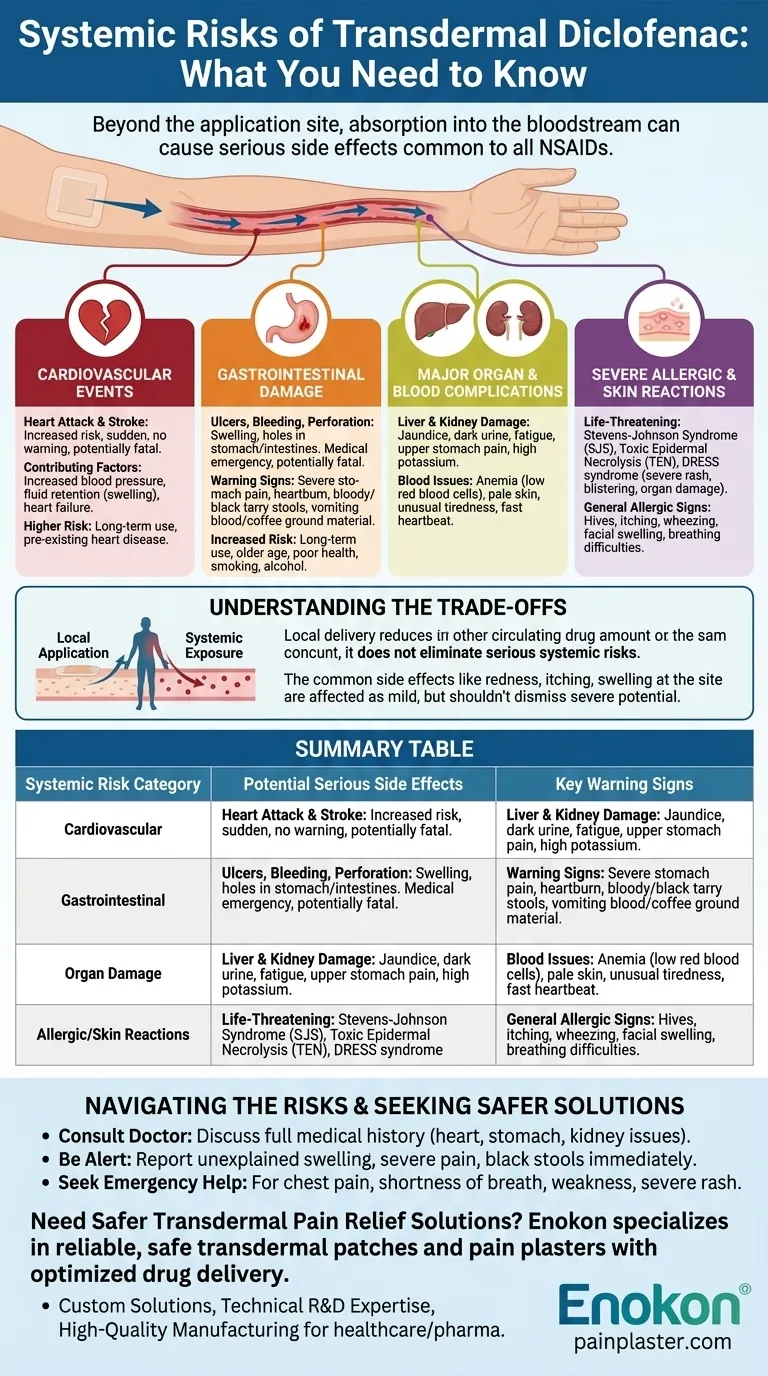Beyond the application site, transdermal diclofenac can cause serious systemic side effects because the drug is absorbed into your bloodstream. These risks include major cardiovascular events like heart attack and stroke, severe gastrointestinal damage such as bleeding or ulcers, liver and kidney damage, and life-threatening allergic and skin reactions.
While applying diclofenac to the skin reduces the overall amount of drug circulating in your body compared to taking a pill, it does not eliminate the risk of serious systemic side effects common to all NSAIDs. The fundamental risks to your heart, stomach, and other organs remain.

Cardiovascular Events: Heart Attack and Stroke
Like other nonsteroidal anti-inflammatory drugs (NSAIDs), transdermal diclofenac carries a significant risk of serious cardiovascular complications.
The Core Risk
Diclofenac can increase the risk of a heart attack or stroke. These events can occur suddenly, without any warning symptoms, and may be fatal.
Contributing Factors
The medication can cause increased blood pressure and fluid retention (swelling in the abdomen, legs, or feet). This fluid buildup can strain the cardiovascular system and potentially lead to heart failure.
Who Is at Higher Risk?
The risk for cardiovascular events is higher for individuals who use the medication for a long time. People with a pre-existing history of heart disease face an even greater risk.
Gastrointestinal Damage: Ulcers and Bleeding
The drug poses a direct threat to the stomach and intestines, which can manifest without prior warning.
The Silent Threat
NSAIDs like diclofenac can cause swelling, ulcers, bleeding, or holes (perforations) in the stomach or intestinal lining. These conditions are medical emergencies and can be fatal.
Warning Signs to Watch For
You must seek immediate medical attention if you experience stomach pain, heartburn, bloody or black and tarry stools, or if you vomit blood or material that looks like coffee grounds.
Increased Risk Factors
The danger of gastrointestinal damage increases with long-term use, older age, poor health, smoking, or consuming alcohol while using the medication.
Major Organ Complications
Because diclofenac circulates systemically, it can impact the function of several critical organs.
Liver and Kidney Damage
The medication can cause liver damage, with symptoms like jaundice (yellowing skin or eyes), nausea, extreme tiredness, dark urine, and upper stomach pain. It can also lead to kidney damage and high potassium levels in the blood.
Blood-Related Issues
A potential side effect is anemia (a low red blood cell count). Symptoms of anemia include pale skin, unusual tiredness, and a fast heartbeat.
Severe Allergic and Skin Reactions
While rare, diclofenac can trigger severe, life-threatening hypersensitivity reactions.
Life-Threatening Conditions
These include Stevens-Johnson Syndrome (SJS), Toxic Epidermal Necrolysis (TEN), and DRESS syndrome. These conditions cause severe rashes, blistering, fever, and widespread inflammation that can damage internal organs like the liver, kidneys, and heart.
General Allergic Reaction Signs
More common (but still serious) allergic reactions can include hives, itching, wheezing, swelling of the face or throat, and difficulty swallowing or breathing.
Understanding the Trade-offs
It is crucial to balance the benefit of localized pain relief with the reality of systemic risks.
Local Application vs. Systemic Exposure
Applying diclofenac topically delivers a higher concentration of the drug to the target tissue with lower concentration in the bloodstream compared to oral pills. This may lower the risk of systemic side effects, but it does not eliminate them.
Common vs. Serious Effects
The most common side effects are typically mild and localized, such as redness, itching, or swelling at the application site. It is critical not to let the mild nature of these common effects cause you to dismiss the potential for the severe systemic issues detailed above.
Navigating the Risks: When to Seek Help
Making an informed decision requires a clear understanding of your personal health profile and a vigilant approach to monitoring your body's response.
- If you are considering using transdermal diclofenac: Discuss your complete medical history with your doctor, especially any past issues with your heart, stomach, kidneys, or blood pressure.
- If you are currently using the medication: Be alert for any of the warning signs mentioned, such as unexplained swelling, severe stomach pain, black stools, or chest pain, and report them to a healthcare professional immediately.
- If you experience sudden, severe symptoms: Seek emergency medical attention without delay for symptoms like chest pain, shortness of breath, weakness on one side of the body, or severe rash.
Ultimately, using this medication safely requires a collaborative partnership with your healthcare provider to weigh the benefits against the potential risks.
Summary Table:
| Systemic Risk Category | Potential Serious Side Effects | Key Warning Signs |
|---|---|---|
| Cardiovascular | Heart attack, stroke, heart failure | Chest pain, sudden weakness, unexplained swelling |
| Gastrointestinal | Stomach ulcers, bleeding, perforation | Severe stomach pain, black/tarry stools, vomiting blood |
| Organ Damage | Liver/kidney damage, high potassium | Jaundice, dark urine, extreme fatigue, upper stomach pain |
| Allergic/Skin Reactions | Stevens-Johnson Syndrome, DRESS syndrome | Severe rash, blistering, fever, facial swelling, difficulty breathing |
Need Safer Transdermal Pain Relief Solutions?
At Enokon, we understand that medication safety is paramount. As a bulk manufacturer of reliable transdermal patches and pain plasters, we specialize in developing formulations that prioritize patient safety while delivering effective pain management.
Our expertise can help you:
- Develop custom transdermal solutions with optimized drug delivery systems
- Benefit from our technical R&D expertise for safer formulations
- Access high-quality manufacturing for healthcare/pharma distributors and brands
Let's collaborate to create transdermal products that balance efficacy with patient safety. Contact our experts today to discuss your specific requirements.
Visual Guide

Related Products
- Asthma Cough and Pain Relief Patch for Adults and Kids
- Far Infrared Deep Heat Relief Patches Medicated Pain Relief Patches
- Mugwort Wormwood Pain Relief Patch for Neck Pain
- Menthol Gel Pain Relief Patch
- Icy Hot Menthol Medicine Pain Relief Patch
People Also Ask
- How does capsaicin work in the Reliever Patch? A Drug-Free Solution for Targeted Pain Relief
- How does the cough relief patch provide targeted relief? Direct, Soothing Comfort for Coughs & Chest Congestion
- How should missed doses of the Reliever Patch be handled? Safe Usage Guidelines
- What types of coughs can the far infrared cough relief patch address? Soothe Dry, Wet, and Persistent Coughs
- What are the key benefits of using the cough relief patch? Soothe Your Cough with Targeted, Non-Oral Relief















